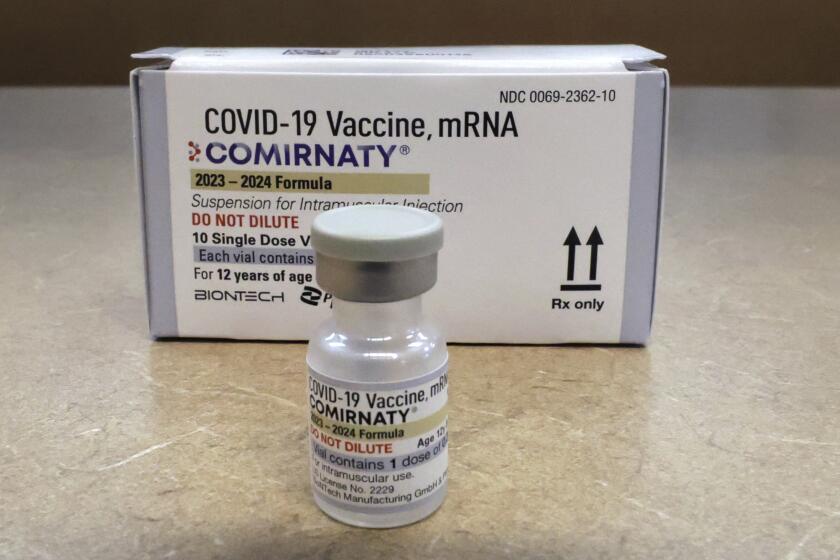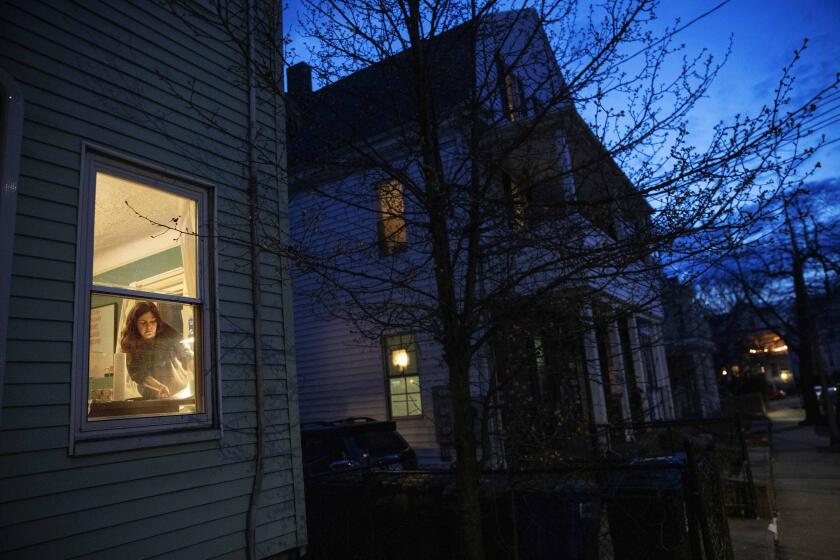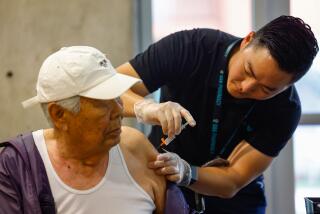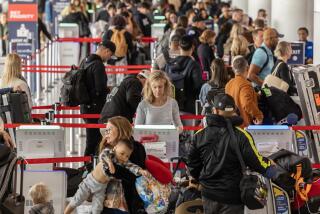Older Californians now eligible for another COVID-19 vaccine dose
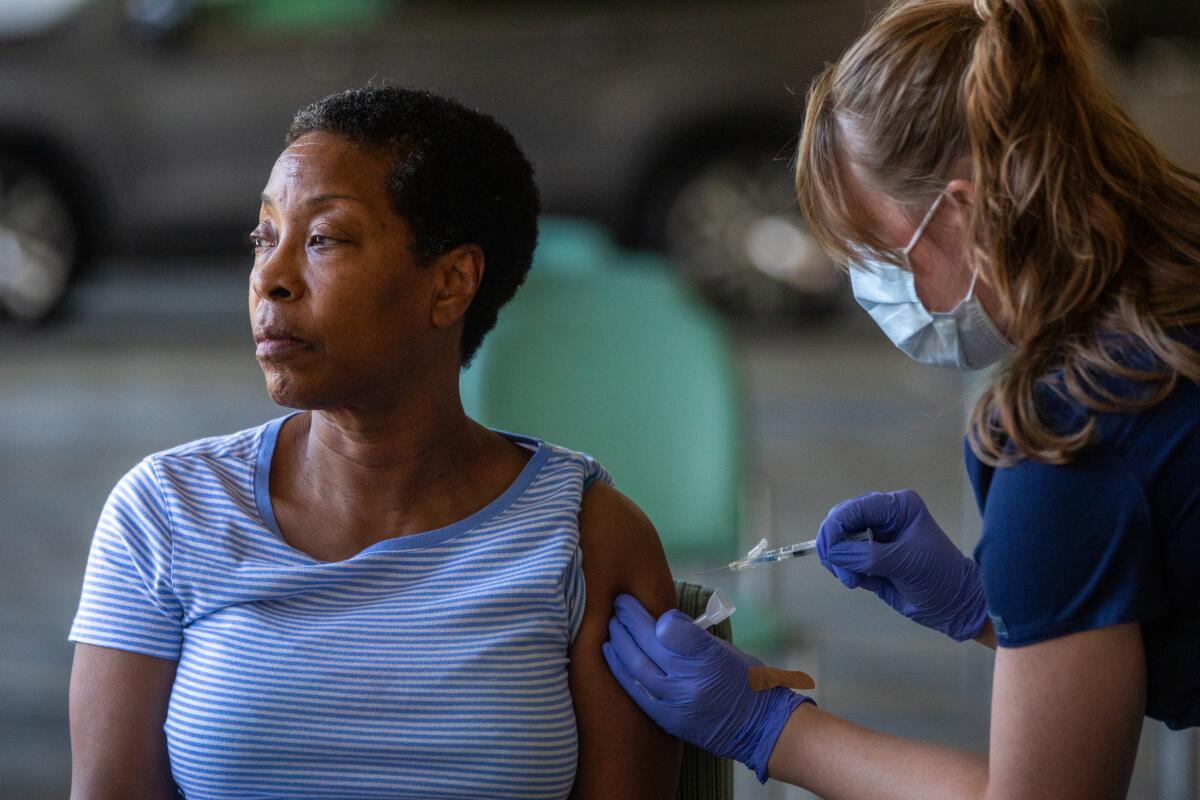
- Share via
Older Californians who received last autumn’s updated COVID-19 vaccination can now get another shot, state health officials said.
Adults 65 and older should get a second dose of the updated shot that first became available in September, as long as at least four months have passed since that injection, the California Department of Public Health said Tuesday, echoing a recommendation issued Feb. 28 by the U.S. Centers for Disease Control and Prevention.
For older adults who got the updated COVID-19 vaccine, getting another dose of the 2023-24 version “provides added protection to residents who are at increased risk of severe illness and death from COVID-19,” the L.A. County Department of Public Health said in a statement.
“An additional dose of the updated COVID-19 vaccine may restore protection that has waned since a fall vaccine dose, providing increased protection to adults ages 65 years and older,” the CDC said in a statement on Feb. 28.
For seniors 65 and up, “You are up to date when you have received 2 updated 2023–2024 COVID-19 vaccine doses,” the CDC says on its vaccine guidance page.
Federal health officials say U.S. adults 65 and older who got a shot of the updated COVID-19 vaccine in the fall should get a booster dose now, if at least four months have passed.
People currently sick with COVID-19 should wait to be vaccinated until they have recovered. Those who have recovered can get their shot as soon as they are healthy, or they can get their vaccination three months later. Reasons for why a person may want an updated vaccination promptly after recovering from a COVID infection include personal risk of severe disease or the risk of disease in a loved one or close contact, the CDC says.
“People who already had COVID-19 and do not get vaccinated after their recovery are more likely to get COVID-19 again than those who get vaccinated after their recovery,” the CDC said.
The L.A. County Department of Public Health said that a preliminary analysis of national data from October and November showed that more than 95% of all adults hospitalized with COVID had not received the latest vaccination.
About 34% of California’s seniors 65 and older have received one dose of the COVID-19 vaccine since September.
The vaccination rate among seniors in Santa Barbara County was 38%; San Diego County, 36%; Ventura County, 35%; Orange County, 32%; Los Angeles County, 29%; and San Bernardino County, 24%.
The highest updated vaccination rates among seniors in California were in Marin County (57%), Sonoma County (53%) and Santa Cruz County (50%).
The CDC said people who test positive for COVID-19 no longer need to stay in isolation for five days and can return to regular activities if their symptoms are mild and improving and it’s been a day since they’ve had a fever.
The five most populous counties in the Bay Area — Santa Clara, Alameda, Contra Costa, San Francisco and San Mateo counties — reported updated senior vaccination rates between 44% and 49%.
In the Central Valley, Sacramento County — the most populous county in the region — had an updated senior vaccination rate of 42%, and the second most populous, Fresno County, was at 26%.
Everyone 6 months and older should have received one updated COVID-19 vaccination since September, the CDC recommends.
COVID-19 levels have been declining in Los Angeles County’s wastewater system since the winter peak, which occurred around mid-January. For the week that ended Jan. 13, coronavirus levels in sewage reached 67% of the prior winter’s maximum.
For the most recent data available, the week that ended Feb. 24, coronavirus levels in L.A. County wastewater were at 16% of last winter’s peak.
Scientists say COVID vaccinations reduce the risk of long COVID. New research from UC San Francisco noted that pieces of the virus that causes COVID have been found in the blood up to 14 months after infection and after more than two years in tissue samples. Scientists there are continuing research into whether these fragments are a factor in causing long COVID to persist.
Kaiser Permanente expects to start offering the second dose of the 2023-24 COVID vaccine to seniors in mid-March, once its computer systems are updated to accommodate the latest recommendation. The second dose could be available earlier in some locations.
CVS, RiteAid and Walgreens said in statements that senior customers can schedule their second dose.
California’s COVID vaccination appointment website, MyTurn.ca.gov, is accepting requests from seniors wanting a second dose.
The L.A. County Department of Public Health said it offers a directory of vaccine providers at ph.lacounty.gov/vaccines; those who have additional questions can call the county’s public health call center at (833) 540-0473 seven days a week between 8 a.m. and 8 p.m.
The public health call center line also can arrange for vaccinations to be administered at home for residents who cannot leave, such as elderly and disabled people.
L.A. County also offers COVID vaccinations at Ted Watkins Memorial Park in Florence-Firestone and Eugene A. Obregon Park in East L.A. Wednesday through Sunday, between 11 a.m. and 6 p.m.
More to Read
Sign up for Essential California
The most important California stories and recommendations in your inbox every morning.
You may occasionally receive promotional content from the Los Angeles Times.
